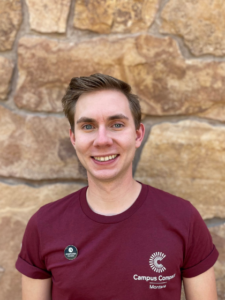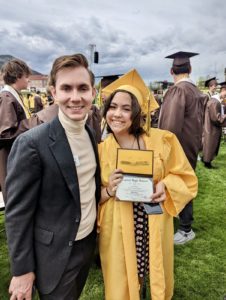Investing in a More Hopeful Future by Noah Aukerman

“My parents kept me out of school today because of shooting and bomb threats,” a student explained to me. Their absence from school prevented them from attending their weekly meeting to receive the academic mentorship and college readiness services my service site offers. However, this student’s worries were well founded. The day prior, Helena police arrested a man who had made three explosive devices with the intention of detonating them at Helena High School. He was also in possession of three semi-automatic rifles which he expressly intended to use at the school as well. Four days later, at graduation ceremonies for Helena schools, I witnessed attendees openly wearing attire depicting semi-automatic weapons and celebrating hardly regulated private gun ownership.
The dissonance of these two images has continued to resonate through my mind and weigh on my heart the past couple weeks. Yet it has also highlighted the importance of the service I do in the area of educational attainment. My students are the future. They are the change that our dissonant world so desperately needs.
Unfortunately, our higher education system is not accessible to many of the people who would benefit the most from it. As a result, our society misses out on the many great contributions some of our brightest young scholars have to offer and will have to offer as they continue to develop themselves.
Education in the United States has been so obsessively monetized that for low-incomes students who would be the first in their family to pursue a post-secondary education, college is far too expensive; especially full-time enrollment which does not leave much room for investing time and energy in a source of income to sustain them through college. I struggle at times to ascertain what exactly my objective is as an advocate and mentor for students aspiring to succeed in higher education under these conditions.
One approach I have witnessed is exposing students to a lifestyle that befits a higher income level than that of the households our students come from, the hope being that students will then be motivated by a desire to achieve this lifestyle by getting degrees and accessing higher paying professional opportunities. But I can’t seem to shake the impression that, in so doing, we implicitly cultivate dissatisfaction in our students by framing their current state as something they should seek to escape from.
Our education system is also quite competitive. In attempting to help students chart their paths forward, it can be tempting to appeal to this competitive element. But it seems that this tactic too presents ethical issues. My desire is not that the value of my students’ academic or intellectual efforts be measured against their peers, and I certainly don’t wish for them to engage in such comparison. I don’t want to be complicit in the emergence of another generation of Americans who seek to outperform one another, acquire and retain wealth and resources, and climb the constructed ladder of social classes that isolates the privileged and starves so many others. Within this system I perceive more dissonance, something I hope to change, not perpetuate.
What is my objective as an advocate and mentor for students aspiring to succeed in higher education? The more I reflect on this question, and the more time I spend learning from my students about the world they live in and the world they envision, the more I become convinced that, whether we are actively involved in the work of educational attainment or simply share a community with young scholars, our role is to present youth with an alternative to this pattern of competition and classism.
While we employ much rhetoric in our academic spaces about doing great things and changing the world, our system is set up in such a manner that, to actually accomplish these things, students must possess some form of capital and be able to prevail when vying against peers for opportunities.
This is a call to anyone who works with students, knows a student, or shares a community with students: Invest in the success of students by giving your time and resources to programs and organizations that promote their success. Protect students by advocating for reforms that make schools and neighborhoods a safer place. The least we can do is eliminate barriers to students’ thriving in educational spaces by making education more affordable and our schools safer. It is also vital that we encourage students by honoring each and every one of their accomplishments without feeling the need to compare them against those of their peers.
Creating a world where all students are resourced, supported, and safe calls for everyone’s participation; not just those whose occupations are rooted in the academy or who serve students through AmeriCorps programs. My service is of little avail without your cooperation. By collectively and collaboratively devoting ourselves to the thriving and success of students, we unlock our future–we empower our youth to dismantle the dissonance they have come to know so well.

 Blog
Blog